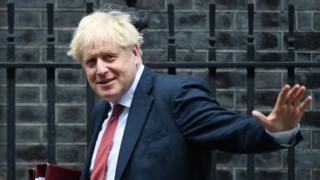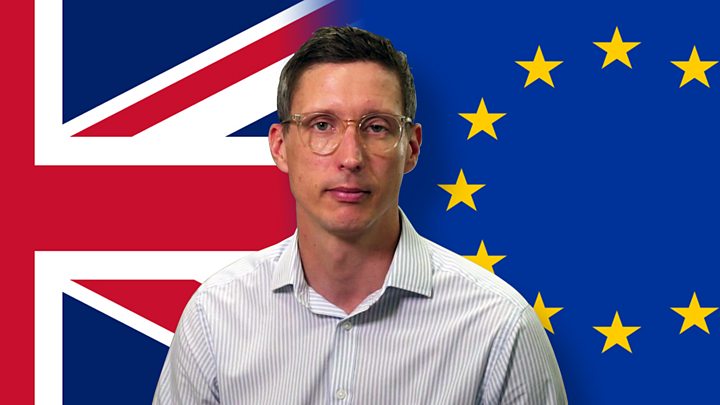 Image copyright
EPA
Image caption
Finishing talks with the EU without striking a deal would still be a "good outcome", the PM will say
Image copyright
EPA
Image caption
Finishing talks with the EU without striking a deal would still be a "good outcome", the PM will say
Prime Minister Boris Johnson is expected to say that if no agreement on trade between the EU and UK can be reached by 15 October both sides should "accept that and move on".
Mr Johnson will say completing the UK's exit from the EU without a trade deal would still be a "good outcome".
It comes after UK chief negotiator David Frost said the UK is not "scared" of walking away.
Another round of talks - the eighth - is due to begin on Tuesday.
But on the eve of the negotiations, the Financial Times reported that the UK is planning new legislation that will override key parts of the Brexit withdrawal agreement made last year.
The new bill would eliminate the legal force of arrangements over customs in Northern Ireland which had been designed to avoid a hard border with the Irish Republic.
It would also override provisions on state aid - the financial assistance sometimes given by the government to companies.
Government sources told the BBC that the legislation would be introduced this week, describing it as a "sensible fall-back option" in case negoiations break down.
They said it was "not intended to derail the talks", but a key EU diplomat told the BBC it was "a self-defeating strategy" that could lead to the trade talks unravelling altogether.
On Sunday, Foreign Secretary Dominic Raab told the BBC's Andrew Marr programme there were two outstanding issues to be resolved in the negotiations, fishing rights and rules over state aid.
The prime minister is due to say that time is running out to find a solution before 31 December, when the UK's transition period ends. Although the UK left the EU on 31 January, it continues to follow some EU rules while the trade agreement is being negotiated.
"We are now entering the final phase of our negotiations with the EU," Mr Johnson is expected to say.
He will say there needs to be an agreement by the European Council on 15 October if it is to be in force by the end of the year, so "there is no sense in thinking about timelines that go beyond that point".
"If we can't agree by then, then I do not see that there will be a free trade agreement between us, and we should both accept that and move on," Mr Johnson will say.

Media playback is unsupported on your device
The UK has said it wants to strike a deal with the EU which resembles Canada's. But Mr Johnson will say no-deal means having a "trading arrangement with the EU like Australia's", using trade protocols set by the World Trade Organisation.
"I want to be absolutely clear that, as we have said right from the start, that would be a good outcome for the UK," the prime minister will say.
He is due to say that "we are preparing, at our borders and at our ports, to be ready for it", although groups representing road hauliers have warned the UK is "sleepwalking into disaster".
'Always ready to talk'
"We will have full control over our laws, our rules, and our fishing waters," Mr Johnson will say.
"We will have the freedom to do trade deals with every country in the world. And we will prosper mightily as a result."
The prime minister is expected to say the UK "will always be ready to talk to our EU friends" even if no agreement is struck, finding "sensible accommodations on practical issues" including flights, lorry transport and scientific co-operation.
He will say there is "still an agreement to be had" if the EU is ready to rethink its positions "even at this late stage".
"But we cannot and will not compromise on the fundamentals of what it means to be an independent country to get it."
The EU's chief negotiator, Michael Barnier, has previously suggested the end of October is a "strict deadline" to finalise an agreement for next year.
He said he has shown "openness to find compromise" but the UK will "have to move" if it wants to avoid the consequences of having no deal.

 5 years ago
719
5 years ago
719 

